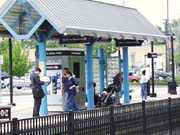The idea of billboards at Liberty State Park was not a good one. That is how Sam Pesin, president of the Friends of Liberty State Park feels about the three of five billboards that were proposed to be built by the park’s Light Rail terminal.
The billboards never came to fruition.
According to published reports late last week, the city of Jersey City had been approached by legal representatives of JSM at Fire Road LLC, a billboard company, to construct five advertising billboards in Jersey City. Jersey City Corporate Counsel Alex Booth said Wednesday that he had been approached by attorney Jack Arseneault, an attorney for JSM, to build five billboards in Jersey City in late 2002.
What makes the story relevant now is two of the men whom the Star Ledger says would have been involved in the deal. Ledger story states Booth was informed by Arseneault that Gary Taffet and Paul Levinsohn were involved in the proposed deal. On Friday, it was reported in the Star Ledger that a grand jury had been assigned to hear testimony in a criminal probe of Taffet and Levinson, who operated billboard firm Matt Outdoor. Taffet is the former chief of staff to McGreevey, and Levinsohn served as McGreevey’s chief counsel.
Both men are involved in a controversy around billboards deals brokered statewide while the two ran McGreevey’s campaign for governor in 2001. According to election law, Taffet and Levinson were required to divest themselves of their company, which located sites for billboards and navigated the projects through local and state approval. Taffet and Levinson are reported in the Star Ledger to have sold 12 billboards to Next Media for $2.2 million.
The probe into the billboard business was confirmed last month in a letter U.S. Attorney Christopher Christie sent to state Senate leaders, according to reports in Friday’s Star Ledger.
"Two of them would have been on the Jersey City-Bayonne border on the Light Rail track," said Booth. "The three others would have been built on state property at Liberty State Park."
Booth noted that Jersey City law prohibited the construction of new signs, but Booth stated that Arseneault argued that state law trumped municipal law regarding what could be built on property.
"I did not see it as so open-and-shut an issue," said Booth.
According to Booth, Arseneault asked "How about we do something for the city?"
"I suggested [that we be given] a big fire truck," said Booth.
According to Booth, the fire truck would have had a value of $600,000.
When asked about the legality of such an offer, Booth said it was legally acceptable to make an offer to a municipality, in this case a hook-and-ladder fire truck.
Activists were against it
Booth noted he was instructed by the City Council in January of 2003 to resolve the situation, but later the council had second thoughts on the matter after community activists protested the construction of the billboards.
"The deal simply withered away," said Booth. "Everyone lost interest."
Stan Eason, spokesperson for Mayor Glenn Cunningham, said Friday that the mayor’s office had no contact with Taffet and Levinson in regards to the proposed billboards.
One of the opponents of the billboard idea was Pesin, who thought their construction of billboards would have obstructed the view of the park from at least two directions.
"Two of the billboards would have gone near the Liberty State Park station and the third would have been placed near Liberty Science Center," stated Pesin.
Visible from the New Jersey Turnpike Extension near Johnston Avenue, Pesin believes the billboards would have blocked motorists’ passing views of the park.
"At the least, you wouldn’t be able to see the Statue of Liberty and the New York skyline when you drove past the park," Pesin stated.
Noting the Liberty Science Center would be expanding its building in the next two years, Pesin stated a billboard by the center would make it unattractive to visitors.
Pesin believes there was also Jersey City’s public image to think of, with billboards by Liberty State Park giving visitors the wrong impression.
"The billboards would have been crass advertisement," Pesin said. "People would drive into Jersey City and say ‘Here’s another town with a bunch of billboards.’ "
"It was good thing the billboards weren’t built," Pesin added.
Booth stated the offer was made in November of 2002, when federal authorities began an investigation of Gary Taffet and Paul Levinsohn.
As of Friday, Arseneault, Taffet’s attorney, Gerald Krovatin, and Levinsohn’s lawyer, Joseph Hayden, did not return phone calls.
